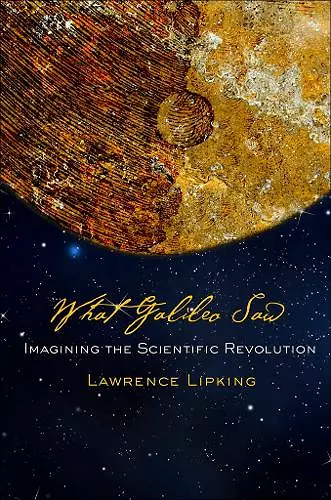What Galileo Saw
Imagining the Scientific Revolution
Format:Paperback
Publisher:Cornell University Press
Published:21st Mar '16
Currently unavailable, and unfortunately no date known when it will be back
This paperback is available in another edition too:
- Hardback£34.00(9780801452970)

The Scientific Revolution of the seventeenth century has often been called a decisive turning point in human history. It represents, for good or ill, the birth of modern science and modern ways of viewing the world. In What Galileo Saw, Lawrence Lipking offers a new perspective on how to understand what happened then, arguing that artistic imagination and creativity as much as rational thought played a critical role in creating new visions of science and in shaping stories about eye-opening discoveries in cosmology, natural history, engineering, and the life sciences.When Galileo saw the face of the Moon and the moons of Jupiter, Lipking writes, he had to picture a cosmos that could account for them. Kepler thought his geometry could open a window into the mind of God. Francis Bacon's natural history envisioned an order of things that would replace the illusions of language with solid evidence and transform notions of life and death. Descartes designed a hypothetical "Book of Nature" to explain how everything in the universe was constructed. Thomas Browne reconceived the boundaries of truth and error. Robert Hooke, like Leonardo, was both researcher and artist; his schemes illuminate the microscopic and the macrocosmic. And when Isaac Newton imagined nature as a coherent and comprehensive mathematical system, he redefined the goals of science and the meaning of genius.What Galileo Saw bridges the divide between science and art; it brings together Galileo and Milton, Bacon and Shakespeare. Lipking enters the minds and the workshops where the Scientific Revolution was fashioned, drawing on art, literature, and the history of science to reimagine how perceptions about the world and human life could change so drastically, and change forever.
The ten amusing and witty essays in What Galileo Saw, which are loosely connected and can be read independently, stem from the premise that if Christian time 'began with the Nativity of Christ, then another age, the dawn of modern times, began when Galileo looked through his spyglass' (p. 3). Lawrence Lipking deals with the cultural impact of the Scientific Revolution and does not claim to explain its genesis beyond recognizing three basic versions of the story.
-- William R. Shea * Isis *While tensions between religion and science and arguments about the loss of meaning in the world were obvious as early as the 1600s and continue today (witness modern scientists such as Carl Sagan in Pale Blue Dot and Richard Dawkins in Unweaving the Rainbow attempting to dispel this perception), Lipking supports his thesis admirably by blending literary analysis of period texts with the philosophers' own writings. He demonstrates that there was no clean line of progress and that the world was never turned fully mechanistic by any of these great scientists. VERDICT Substantial and erudite, this title will appeal to scholarly readers studying the philosophy and history of science.
-- Evan M. Anderson * Library Journal *Eighteenth-century literary studies have always been interdisciplinary; understanding Pope and Swift entails understanding garden history and developments in astronomy. Distinguished historian of literary and art theory and of the novel, Lipking (emer.Northwestern) has done enough homework to write a book about the scientific revolution that passes muster with such discerning of historians of science as Peter Dear. The book is not, as it first seems, a connected account of the role of visual imaging in science; rather, Lipking offers a series of meditations on individual figures from Galileo and Kepler to Hooke and Newton.... Lipking's audience is not historians of science but students of literature and even, given his admirable clarity, general readers, for whom he has provided a thoroughly accessible intellectual feast.
-- D.L. Patey * Choi- Winner of Choice Magazine 2015 Outstanding Academic Title.
ISBN: 9781501704390
Dimensions: 235mm x 155mm x 19mm
Weight: 454g
336 pages